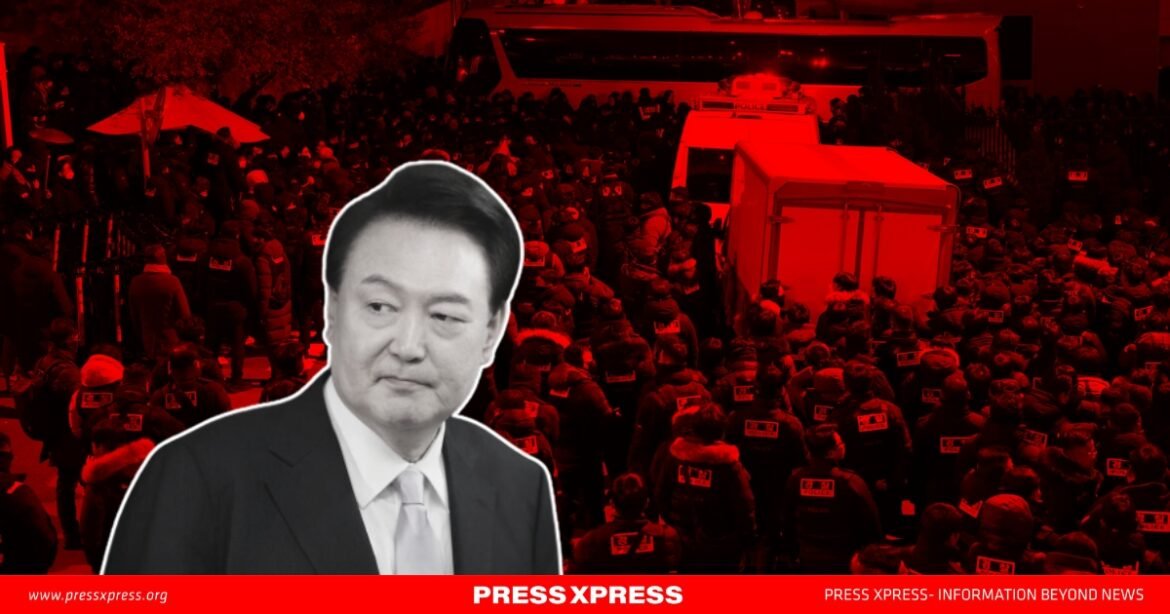In the pre-dawn hours of Wednesday, South Korean investigators, armed with ladders and bolt cutters, breached barricades and barbed wire to arrest suspended President Yoon Suk Yeol at his residence in central Seoul. The dramatic operation brought an end to weeks of standoff and turmoil, cementing Yoon’s place as the first sitting South Korean president to be detained on criminal charges.
The arrest marks a critical moment in South Korea’s political history, thrusting the nation into uncharted waters. Yoon, 64, faces allegations of insurrection tied to a failed martial law declaration on December 3. The move plunged the country into chaos, leading to his impeachment and suspension, though his official removal from office awaits a Constitutional Court ruling.
A Dramatic Arrest
The operation involved over 1,000 officers, including members of the Corruption Investigation Office for High-ranking Officials (CIO) and local police, who launched a coordinated effort to detain the embattled leader. Scaling walls and bypassing barricades, investigators overcame resistance from Yoon’s security detail, which had thwarted an earlier arrest attempt on January 3.

Footage from the scene showed officers removing barbed wire and navigating through a maze of security measures before taking Yoon into custody. Outside the residence, opposing crowds of Yoon’s supporters and detractors clashed, highlighting the stark divisions in South Korean society.
In a short video released just before his arrest, Yoon decried the investigation as “illegal” but said he would comply to prevent bloodshed. “I witnessed them invade my home with fire equipment,” he claimed, accusing investigators of breaching legal protocols.
Charges and Controversy
The charges against Yoon stem from his martial law declaration, which he justified as a response to “anti-state forces” he claimed were infiltrating South Korea’s institutions. Critics argue the move was a political gambit, as Yoon’s government faced mounting opposition after a landslide defeat in last year’s parliamentary elections.
Parliament swiftly voted to impeach Yoon, accusing him of abusing his authority. His impeachment, however, requires confirmation from the Constitutional Court, which is expected to deliver a ruling by February.
Yoon’s legal team has called his arrest unlawful, arguing that the CIO lacks jurisdiction to investigate insurrection charges. “This is a violation of the rule of law,” his lawyers said in a statement. The CIO, an anti-corruption agency established in 2020, claims Yoon abused his power, but its role in the case has sparked controversy, with critics accusing it of political bias and overreach.
Public Divisions
The arrest has further polarized South Korea’s political landscape. Pro-Yoon supporters, many of whom view him as a defender of conservative values, have vowed to fight the charges. “We are devastated. This is not justice,” said one supporter at a protest outside the CIO office in Gyeonggi Province, where Yoon is being held.
In stark contrast, anti-Yoon demonstrators celebrated his arrest. Crowds gathered in Seoul, waving flags and singing songs of triumph. “This is a victory for democracy,” said Park Chan-dae, a leader in the opposition Democratic Party, which spearheaded Yoon’s impeachment.
Polling data highlights the divide. According to a recent survey by Gallup Korea, 56% of respondents supported Yoon’s impeachment, while 35% opposed it. The data underscores the ideological rift between South Korea’s conservative and progressive blocs, a divide that has widened during Yoon’s tenure.
What Happens Next?
Yoon’s arrest sets the clock ticking for investigators. Under the current warrant, authorities can detain him for 48 hours, after which they must seek an extension to continue their investigation. If granted, Yoon could be held for up to 20 days while prosecutors prepare charges.
The Constitutional Court’s upcoming decision on Yoon’s impeachment looms large. A ruling to uphold it would permanently remove him from office, clearing the way for a snap presidential election.
In the interim, Finance Minister Choi Sang-mok is serving as acting president. The political vacuum has heightened uncertainty in a country already grappling with economic challenges, including sluggish growth and rising youth unemployment.
A Test of Democracy
Yoon’s arrest is the latest chapter in South Korea’s tumultuous political history, which has seen two former presidents impeached and imprisoned in recent decades. However, the stakes are higher this time, as the nation grapples with questions about the integrity of its institutions.
“The struggle we are witnessing is not just about Yoon Suk Yeol—it’s about the future of South Korean democracy,” said Professor Lee Sang-min, a political analyst at Seoul National University. “This case will test whether the rule of law can prevail over political polarization.”
For now, South Korea remains a nation divided, its streets echoing with chants of both outrage and celebration. As the investigation unfolds, the outcome will not only determine Yoon’s fate but could also reshape the nation’s political landscape for years to come.


